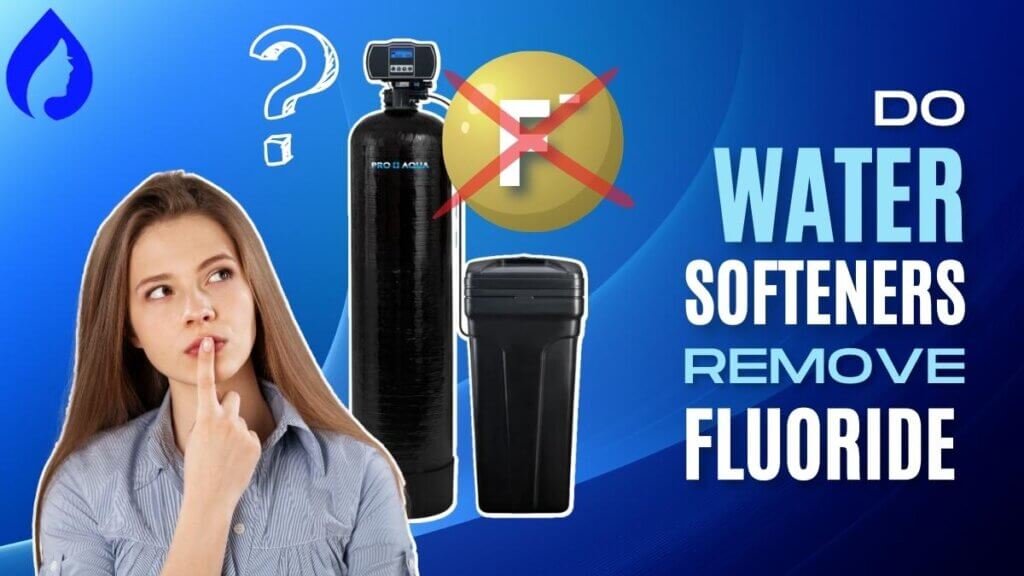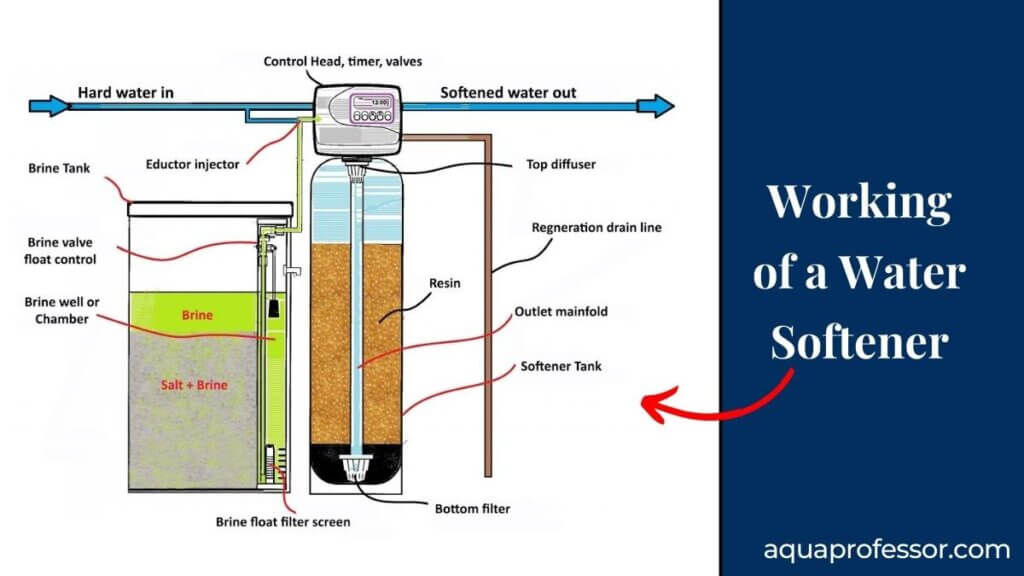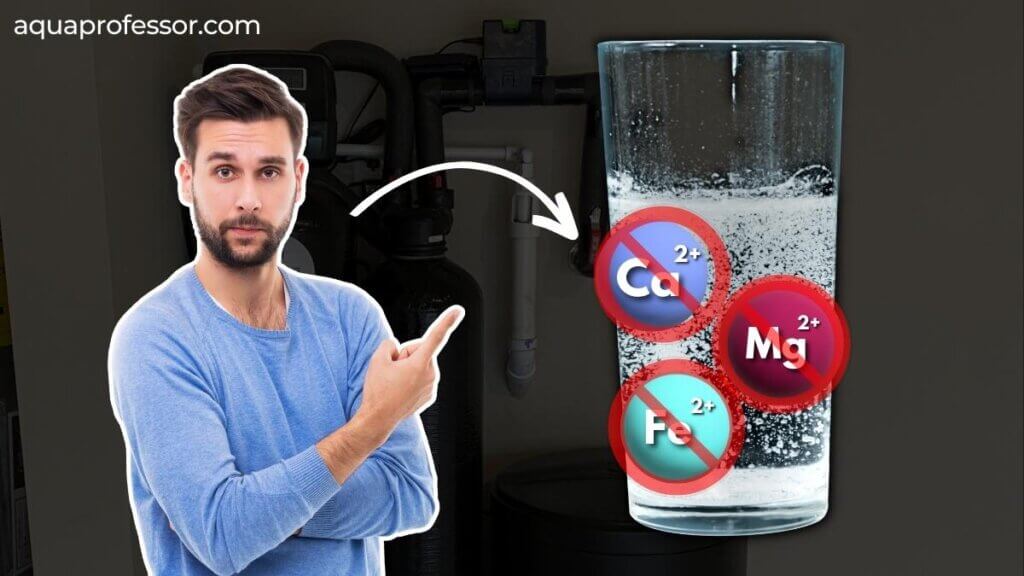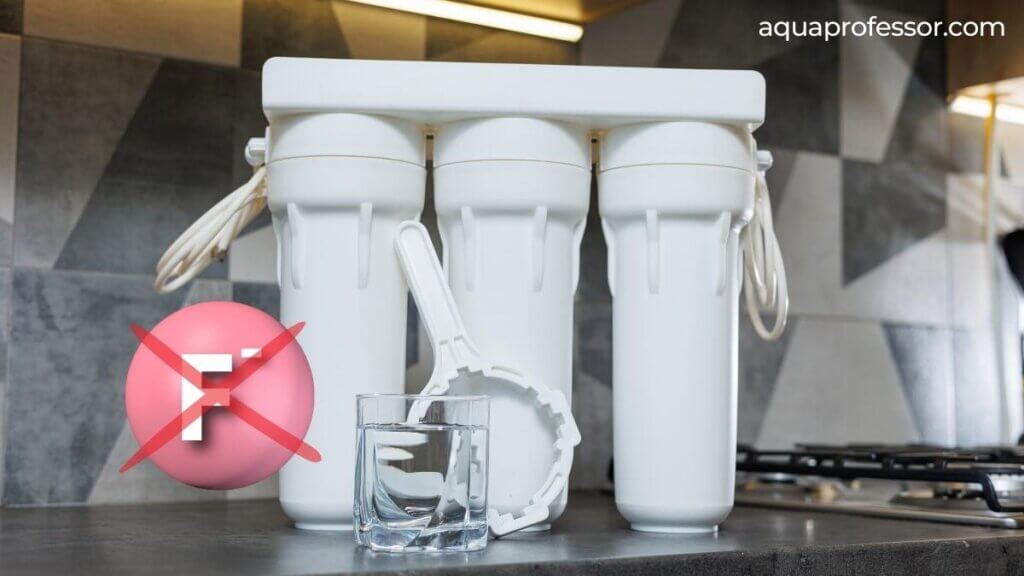
No, water softener does not eliminate fluoride. Water softening systems are designed to remove hardness minerals like calcium and magnesium, but they do not help remove fluoride or other heavy metals.
Why, I hear you ask?
Continue reading to know the details, along with the effective fluoride removal systems (they aren’t that expensive!).
🤔Why Can’t Water Softeners Remove Fluoride?

Water softeners significantly reduce the hard water minerals from your incoming water, but the same water softener does not work for removing fluoride.
Why?
It’s because water softeners contain a resin bed. This bed can only exchange cations (positively charged ions) like calcium, magnesium, and iron. But, anions (negatively charged ions) like fluoride, chloride, nitrate, and sulfate aren’t attracted to the resin bed and hence can’t be removed by your softener.
Hence, fluoride concentration in drinking water stays the same. Excess fluoride (which is rare even in city water) can lead to dental fluorosis and fluoride poisoning.
Note: Anion exchange can remove harmful anions like arsenic and nitrates (fluoride, too) and replace them with lesser-harmful anions like chloride, which can be easily filtered later.
But anion exchange systems are hard to find for domestic use. For practical yet effective fluoride removal options, skip to this section.
🎯How Does A Water Softener Work?

Water softeners are designed to remove hardness-causing minerals like calcium and magnesium ions via cation ion exchange.
The water softener has a set-up of two tanks:
First, hard water is made to enter the resin tank. The resin tank has a resin bed that is negatively charged and attracts positively charged calcium and magnesium hard water minerals from water and exchanges them with sodium ions; this makes the hard water soft and rich in sodium content.
When a resin bed is fully charged with calcium and magnesium ions, it needs time to flush these minerals from the resin tank into the drain. After flushing, with the help of brine water from the brine tank, it replenishes the resin bed with positively charged sodium ions. This is called the regeneration cycle.
Hence, this is how water softeners work to clear out hard minerals and to give you soft water, which causes less scale buildup and gives a high lather with soaps and detergent.
Also Read: Do Water Softeners Remove Chlorine?
🧹What Can A Water Softener Remove?

Water softeners eliminate a wide range of ions like:
All these ions are positively charged ions exchanged with negatively charged resin beds and removed from hard water during the softening process.
But negatively charged ions like:
Water softeners cannot remove them as they are not attracted to the resin bed; hence, their concentration remains unchanged.
👉How To Remove Fluoride From Water?

The following five water filtration systems can easily decrease high fluoride levels:
1️⃣Reverse Osmosis Water Filter
2️⃣Activated Alumina Filters
3️⃣Bone Char Carbon Filters
4️⃣Distillers
Also Read: How Much Fluoride Is In Well Water?
🚰Should I Remove Fluoride From My Tap Water?

Fluoride occurs naturally in groundwater but is also added to make fluoridated water by many municipal water systems to prevent tooth decay.
But excess fluoride exposure from water, toothpaste, food, and beverages, dental products can cause various health-related problems:
Hence, limiting the excess fluoride concentration is very important. For this, EPA has recommended 0.7 mg/L as a safe level of fluoride. It is better to remove fluoride from water as you already get it through dental products.
💡Do Water Softeners Remove Fluoride FAQs
Does reverse osmosis remove fluoride?
Yes, the reverse osmosis system is a very effective way of removing fluoride from water. Ro system uses a semi-permeable membrane to remove 90% of the fluoride concentration making your water safe to drink and cook.
Does boiling water remove fluoride?
No, Boiling water isn’t a good option as it does not remove fluoride ions from your water. On the other hand, it’ll increase fluoride concentration as it doesn’t get vaporized with water thanks to its high boiling point.
Does well water have fluoride?
Yes, Fluoride naturally occurs in groundwater through the erosion of underground rocks. It may also enter water supplies via industrial discharge.
You should check the concentration of fluoride in a certified lab after every 2 years, as high fluoride concentration poses problems such as decreased oral health, especially among children.
Is all bottled water fluoride-free?
FDA has set a higher limit of 0.7 mg/L for fluoride concentration in bottled water. So unless the manufacturer declares their bottled water “fluoride-free,” it might contain trace amounts of the mineral.
Is Too Much Fluoride in Water Bad for Teeth?
Yes, too much fluoride in your water is bad for your teeth. While low fluoride helps strengthen teeth and reduces tooth decay, high fluoride may cause other dental health issues like dental fluorosis, mottled enamel, and poor mineralization.
Adarsh is a Health & Nutrition Sciences graduate with expertise in environmental health. He is associated with ventures like Glacier Fresh Filter and Simpure Filter Systems. Through Aqua Professor, he intends to provide helpful information to every home to help them make smarter decisions.
